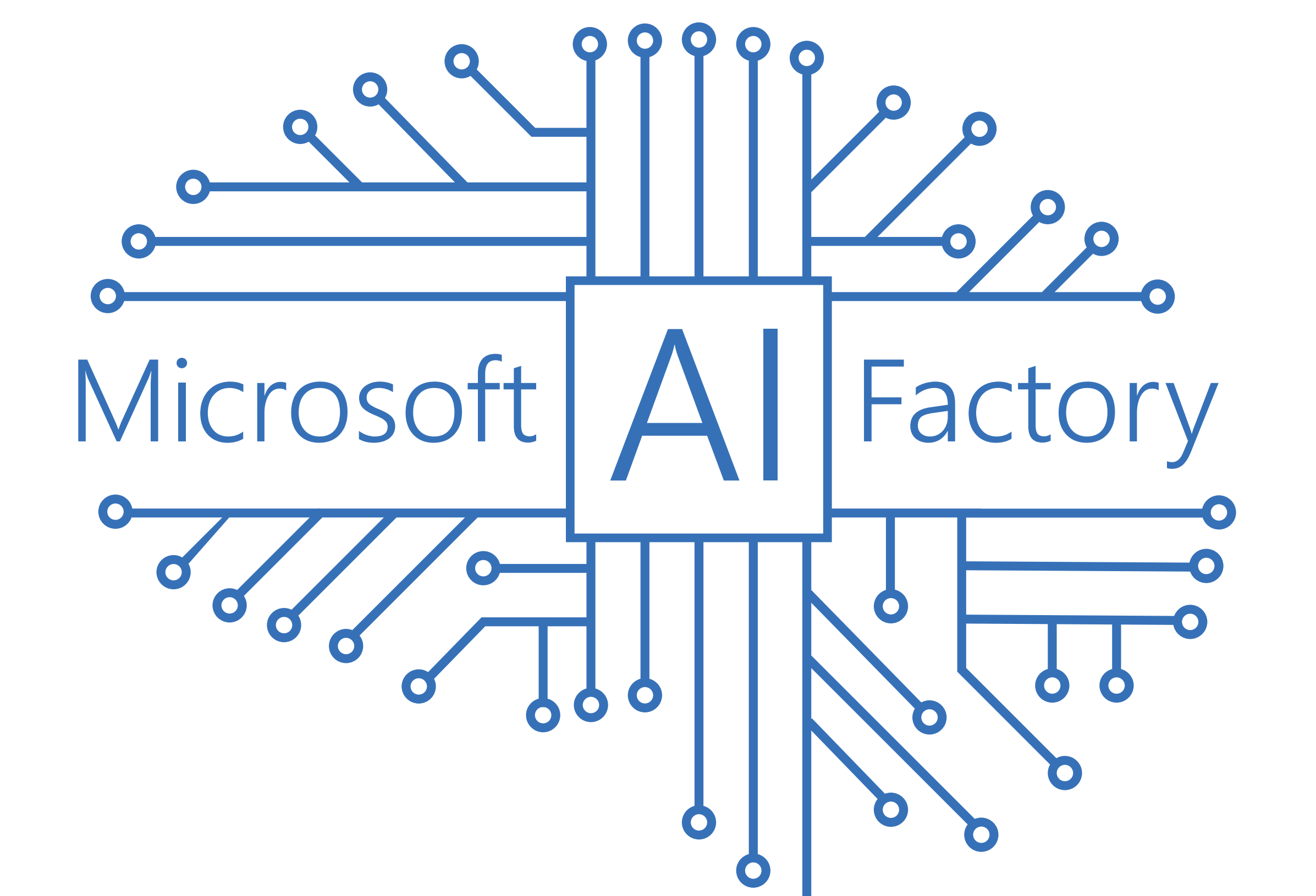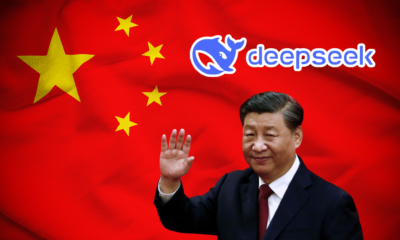Tech
Microsoft’s Earnings Beat Estimates, But Stock Slips—Probes If DeepSeek Stole OpenAI Data For Training. But There’s Something That’s Exciting Nadella, What Is It?
Published
1 year agoon

Microsoft posted stronger-than-expected second-quarter earnings and revenue on Wednesday, surpassing Wall Street estimates. The company reported earnings of $3.23 per share on revenue of $69.6 billion, outperforming analyst projections of $3.11 per share on revenue of $68.9 billion, according to FactSet.
CEO Satya Nadella noted Microsoft’s ongoing innovation and AI-driven strategies, stating, the company is innovating across tech stack and helping customers to unlock the full ROI of AI to capture the tremendous opportunity ahead.
However, despite the solid earnings, Microsoft shares declined 5% in after-hours trading following the company’s disclosure that Azure and other cloud services saw 31% revenue growth for the quarter, a slowdown from the 33% growth reported in the previous quarter.
On the earnings call, CFO Amy Hood reiterated expectations for double-digit revenue and operating income growth for the full fiscal year but cautioned that a strong U.S. dollar could create foreign exchange headwinds, impacting third-quarter revenue.
The company also reported capital expenditures of $15.8 billion for the quarter, slightly exceeding Wall Street’s estimate of $15.6 billion and significantly higher than the $9.7 billion spent in the same period last year.
Commenting on Microsoft’s AI investments, Thomas Monteiro, senior analyst at Investing.com, noted that growth in the AI space, particularly within Azure, needed to accelerate given the company’s high level of spending. Microsoft’s aggressive push into generative AI has remained a key focus for investors, a sentiment heightened by recent market interest in the Chinese AI start-up DeepSeek.
Microsoft was among several tech stocks that declined earlier in the week amid concerns over competitive risks from DeepSeek, which reportedly developed an AI model comparable to ChatGPT for just $5.6 million. This figure, which circulated widely on social media, raised questions about Microsoft’s substantial AI-related expenditures. However, a closer analysis suggests that the $5.6 million investment does not fully represent DeepSeek’s overall AI development costs.

The discussion has reignited a crucial debate for Microsoft investors – Is the company overspending on AI?
Microsoft, in a blog post dated January 3, reaffirmed its commitment to AI expansion, stating plans to invest approximately $80 billion in 2025 to develop AI-enabled data centers, enhance AI training capabilities, and scale cloud-based applications globally.
The company is not alone in its high AI spending. Meta Platforms CEO Mark Zuckerberg recently announced plans to allocate between $60 billion and $65 billion in capital expenditures this year, with a significant portion directed toward AI team expansion.
Microsoft and other tech giants may also look into developing more cost-efficient AI models similar to DeepSeek’s. Investors will closely watch for updates from Microsoft’s leadership on this front.
During the earnings call, Nadella acknowledged DeepSeek’s advancements, saying the company had introduced “real innovations.” He also noted that as token prices and inference computing costs decline, AI adoption will increase, ultimately benefiting Microsoft’s broader ecosystem.
Despite the company’s ambitious AI investments and strong earnings report, Microsoft shares closed lower in extended trading on Wednesday.
Microsoft, Did DeepSeek Take Data From OpenAI?
Microsoft and OpenAI are investigating whether a group linked to Chinese AI startup DeepSeek may have obtained OpenAI’s data output in an unauthorized manner, according to a report on Tuesday.
According to the report, Microsoft’s security team reportedly observed individuals, believed to have ties to DeepSeek, extracting a significant volume of data via OpenAI’s application programming interface (API) last fall. The API serves as the primary channel for software developers and businesses to access OpenAI’s services. Microsoft, a key OpenAI backer, alerted the ChatGPT maker about the suspicious activity.
DeepSeek, a low-cost Chinese AI startup positioning itself as an alternative to U.S. AI firms, recently made waves in the tech world after its free AI assistant surpassed OpenAI’s ChatGPT in downloads on Apple’s App Store in the U.S. The development triggered a selloff in tech stocks on Monday.
Microsoft and Meta Defend AI Investments Amid DeepSeek’s Disruption
Following DeepSeek’s emergence as a potential AI disruptor, Microsoft and Meta’s chief executives have defended their aggressive AI spending, arguing that substantial investment is necessary to remain competitive in the rapidly evolving field.
DeepSeek’s ability to produce AI models at a fraction of the cost of its Western counterparts has sparked concerns over the U.S.’s AI leadership. However, American tech leaders insist that building large-scale computing infrastructure is essential to meeting the growing demands of enterprise customers.
Meta CEO Mark Zuckerberg stated on a post-earnings call that over time, investing very heavily in capital expenditure and infrastructure is going to be a strategic advantage.
Microsoft CEO Satya Nadella echoed similar sentiments during an analyst call emphasizing that overcoming capacity constraints is critical for fully capitalizing on AI’s potential and as AI becomes more efficient and accessible, the demand would rise exponentially.
Microsoft has committed $80 billion to AI investments this fiscal year, while Meta plans to allocate as much as $65 billion. These figures stand in sharp contrast to DeepSeek’s claim of spending only around $6 million to develop its AI model. However, U.S. tech executives and Wall Street analysts suggest that DeepSeek’s reported spending likely accounts only for computing costs, rather than total development expenditures.
Investors Seek Clarity on AI Spending Returns
Despite the tech giants’ confidence in their AI strategies, some investors are beginning to question whether the massive capital outlays will yield tangible returns.
As Brian Mulberry, portfolio manager at Zacks Investment Management, which holds Microsoft shares puts it – one needs to start seeing a clear roadmap to what that monetization model looks like for all of the capital that’s been invested.
Microsoft CFO Amy Hood stated that the company’s capital expenditures for the current and upcoming quarters would remain around the $22.6 billion level recorded in the second quarter. Looking ahead, she noted that while AI investments will continue into fiscal 2026, the growth rate of spending is expected to be lower than in fiscal 2025, which ends in June.

Why Nadella is Excited About DeepSeek Instead of Worried?
After DeepSeek’s launch, many expected Microsoft to be on edge. The Chinese startup developed an AI model at a fraction of the cost of its U.S. counterparts, positioning itself as a direct competitor to Microsoft’s AI tool, Copilot. Yet, Microsoft CEO Satya Nadella remains optimistic.
A day after DeepSeek’s global debut, Nadella took to X (formerly Twitter) to express his enthusiasm. He referenced Jevons paradox, a concept from economics, stating, that as AI gets more efficient and accessible, one will see its use skyrocket; but why does Nadella see DeepSeek’s emergence as a reason for excitement rather than concern?
First, let us understand what is Jevons Paradox?
Jevons paradox, first described by British economist William Stanley Jevons in 1865, references a counterintuitive phenomenon – when a resource becomes more efficient to use, its overall consumption doesn’t decline—it increases.
Jevons observed this with coal consumption during the Industrial Revolution. More efficient steam engines didn’t reduce coal use; instead, they made coal-powered technology more practical, leading to greater adoption and increased demand.
The same principle has applied across industries. Improved fuel efficiency in cars, for instance, hasn’t reduced total fuel consumption—rather, it has encouraged more driving and, in turn, higher overall fuel demand.
Applying Jevons Paradox to AI
Nadella sees AI through the same lens—greater efficiency doesn’t mean AI demand will plateau—it will explode. DeepSeek’s efficiency could accelerate AI adoption in ways previously unimaginable, triggering a ripple effect that benefits Microsoft and the broader AI industry.
1. Lower Barriers, Higher Adoption
DeepSeek’s innovations make AI cheaper, faster, and more accessible, allowing more companies and individuals to integrate AI into their workflows. Instead of replacing existing AI demand, this efficiency opens the floodgates for new users and applications.
2. New Use Cases, Bigger Market
Many businesses—especially small enterprises, NGOs, and emerging markets—previously found AI too costly or complex to implement. If DeepSeek lowers these barriers, it will unlock entirely new markets, much like how the rise of cloud computing allowed startups to scale without massive infrastructure costs.
3. More Data, More AI Demand
As AI becomes embedded in more sectors, the volume of data generated and analyzed will skyrocket. This, in turn, creates demand for more advanced AI tools, such as predictive analytics, AI-powered customer service, and automation platforms.

The Last Bit
For Microsoft, DeepSeek’s rise is less about immediate competition and more about AI’s accelerating adoption curve. The broader AI industry is poised for exponential growth, and Microsoft’s strategy of investing heavily in AI infrastructure ensures it remains at the center of this expansion.
Hence, Nadella’s optimism is grounded in a long-term vision that AI is not a zero-sum game. Just as the internet disrupted traditional industries while creating new ones—e-commerce, digital marketing, and social media—AI is poised to reshape the economy in ways we can’t yet fully predict.
DeepSeek may be a disruptor, but its impact aligns with the Jevons paradox, rather than limiting AI’s dominance to a few players, greater efficiency will fuel broader adoption, bringing AI deeper into everyday life. That’s the kind of future Nadella is betting on.
You may like
-


A Trade War That Just Won’t Quit. As Trump’s Tariffs Hit, China Stays The Course, For Xi’s Its Business As Usual Strategy
-


DeepSeek Ai Rush. China’s AI Contender Gears Up for Next Big Launch Even As It Gets Xi Jinping’s Blessings
-


Layoffs Are Back. JPMorgan, Chevron, And More—Why Across All Sectors Nearly Half Of Companies Expect Job Cuts In 2025?
-


All About The Union Budget 2025-26—Worthy of Claps, Or Is There Something Lurking That We May Have Missed?
-


Aviation Chaos. Belgium Airspace Shutdown, US Frontier Airlines Ground Stop—Glitches Or A Warning Sign For Our Fragile Infrastructure?
-


The Stock Market’s Cracking—And It’s Not Pretty. FIIs Exodus But Analysts Sight Long Term Potential Despite Rs 32,00,000 Core Investor Wealth Gone In 2025. What Is The Bear-ish Deal Here?
